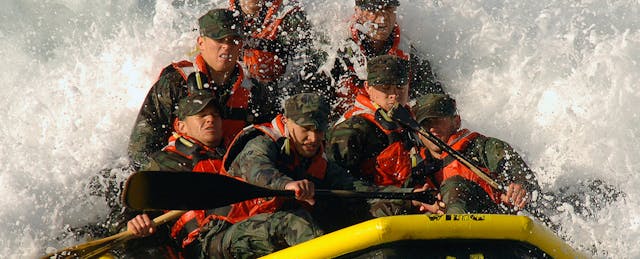In schools across the country, the stakes are getting higher, excuses are getting fewer, and the classroom is becoming a verbal battleground. Recent headlines describe how educators are “at war” with the achievement gap, while policymakers set “battle lines” with teachers unions or are “combating” poor school cultures.
The way we talk about education reform appears to have intensified. If combat strikes you as a violent metaphor for the classroom, you’re not alone. These warfare metaphors are likely intended to underscore the unrelenting challenges that schools face.
Deploying the SEALs
A handful of publications, along with Hollywood director M. Night Shyamalan, suggest teachers need to be the Navy SEALs of the classroom in order to save our education system. This proposed solution calls for a new cadre of inexperienced, yet elite classroom practitioners tasked with accomplishing longstanding education missions: closing achievement gaps, turning around underachieving schools, and keeping pace with international test scores.
Teachers need to be "Navy Seals" of #education. -@MNightShyamalan http://t.co/ZRYUausHUk #Askwith
— HGSE Live Events (@HGSE_live) April 28, 2014
Comparing teachers to SEALs struck me as an odd metaphor from the start. Education blogger Jennifer Berkshire satirized the comparison in her post, “Send in the SEALs,” highlighting how we should be most selective when replacing “our old, low-expectations teachers with fresh young commandos.”
There’s no question that we should equip teachers with the most advanced professional skills and tools before they enter the classroom. But I wanted to know whether the metaphor was appropriate or valuable.
So I decided to ask an actual SEAL.
The Makings of a Metaphor
The use of war-related words is nothing new to the education reform discussion. Academic papers have offered phrases like “drawing the battle lines” as far back as 1967. Yet it’s only in recent years that references to Special Operations forces, including SEALs, have emerged when referring to teachers.
I was put in touch with a former SEAL officer, to whom I’ll refer as “Mr. Thomas” for this post (as he wished not to be identified---a sensible practice for retired special forces members). In talking with him, whose missions spanned over a decade of service, he raised two primary concerns with the comparison. For one, there are a number of nuanced differences between the two roles--teachers mostly work alone in the classroom, whereas Special Operations forces are fully embedded within a team. Yet there are larger, more discomfiting cultural divides.
First, it’s important to recognize that the ratio of personnel to available funding between the two professions are at complete opposites. With over 3.3 million teachers in public schools nationwide, teaching is a major profession that supports the entire education system. SOCOM (the United States Special Operations Command), on the other hand, encompasses only 72,000 total personnel, including its robust support staff, and a minuscule fraction (1.6%) of the Department of Defense’s total budget. Elite special operators who perform missions overseas comprise an even smaller fraction of SOCOM.
“Despite the prominent role SEALs play in the American consciousness, the media, and foreign policy, few people in the military work with or anywhere near a special operations unit,” Mr. Thomas told me, as one of the strengths of SEALs is that they operate in small numbers. “Each SEAL operator gets ample support from the DoD’s massive budget and stable of supporting assets.” It would be hard to imagine the Department of Education providing a similar level of individual support for teachers, despite the fact that students interact with teachers on a daily basis.
Beyond differences in resources or support though, Mr. Thomas provided another example that makes the comparison untenable: the human organization. Teachers, even if amenable to cooperation, mostly perform on their own. SEALs almost always work as teams. Mr. Thomas furthered the point based on his own experiences:
“Almost every phase of Special Operations forces training culminates in a team trial. Individual skill sets are valued and emphasized in selection and early phases of military training, but those skills are rendered moot if the operator cannot or will not integrate his talents into a team context. A SEAL who doesn’t integrate with other operators will be weeded out and will not conduct missions.”
Simply put, teachers shouldn’t be trained as SEALs because they don’t operate like SEALs.
Media and the Metaphor
If such glaring differences exist between the structures in which teachers and SEALS perform, then why have we continued to compare the two with increasing regularity? When asked, Mr. Thomas was sincere:
“The media has lionized Special Operations forces via fawning embedded interviews, unbridled memoir publication, and big-budget Hollywood movies,” he explained, referring to box offices hits like American Sniper, Captain Phillips and Zero Dark Thirty. “Special Operations forces, and the Navy SEALs especially, have taken form in the American consciousness as the ‘easy button,’ a panacea that can easily neutralize American problems overseas.”
Looking Ahead
In training the next generation of teachers, there’s no doubt that we should aspire to develop highly-skilled, precise practitioners. We may admire SEALs for their tenacity and effectiveness in the face of daunting missions. But what are the implications of using combat-related language as a proxy for education?
Attaching a “like SEALs” metaphor to teaching may inadvertently add an “at all costs” mindset to teachers. At a time when 40-50% of new teachers drop out within the first 5 years (a figure that’s heavily skewed toward high-poverty classrooms), calling for teachers to perform as SEALs may miss the larger issues.
Almost every teacher already faces daunting challenges of her or his own, whether it’s supporting a fourth-grader who’s reading at a second-grade level or providing constructive feedback on a high schooler’s college admissions essay. Those sorts of challenges don’t call for a special operations mentality.
That’s why it's critical that we frame our understanding of training teachers in the right context, not the easy metaphor. Let’s commit ourselves to shifting focus away from the battlefield and back to the classroom.


